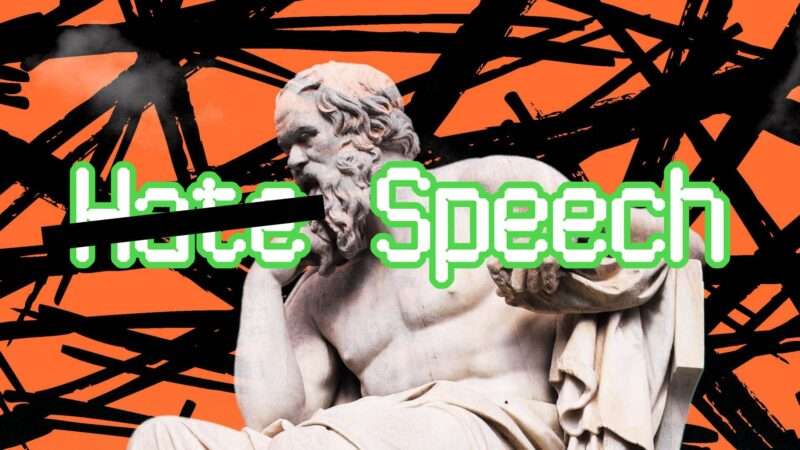
Here’s a brutal irony about regulating hate speech: Such laws often end up hurting the very people they are supposed to protect.
That’s one of the central lessons in Jacob Mchangama’s important new book, Free Speech: A History from Socrates to Social Media. Mchangama heads up the Danish think tank Justitia. He’s worried about a proposal that would make hate speech a crime under European Union (EU) law and give bureaucrats in Brussels sweeping powers to prosecute people spewing venom at religious and ethnic minorities, members of the LGBT+ community, women, and others.
Europe’s history with such laws argues against them. In the 1920s, Germany’s Weimar Republic strictly regulated the press and invoked emergency powers to crack down on Nazi speech. It censored and prosecuted the editor of the anti-Semitic Nazi paper Der Stürmer, Julius Streicher, who used his trial as a platform for spreading his views and his imprisonment as a way of turning himself into a martyr and his cause into a crusade. When the Nazis took power in the early ’30s, Mchangama stresses, they expanded existing laws and precedents to shut down dissent and freedom of assembly.
Contemporary scholarship suggests that there can be a “backlash effect” when governments shut down speech, leading otherwise moderate people to embrace fringe beliefs. Mchangama points to a 2017 study published in the European Journal of Political Research that concluded extremism in Western Europe was fueled in part by “extensive public repression of radical right actors and opinions.”
In 1965, the United Kingdom passed a law banning “incitement to racial hatred,” but one of the very first people prosecuted under it was a black Briton who called whites “vicious and nasty people” in a speech. More recently, Mchangama notes that radical feminists in England “have been charged with offending LGBT+ people because they insist there are biological differences between the sexes. In France, ‘an LGBT+ rights organization was fined for calling an opponent of same-sex marriage a ‘homophobe.'”
“Once the principle of free speech is abandoned,” warns Mchangama, “any minority can end up being targeted rather than protected by laws against hatred and offense.”
That’s what happened in Canada in the 1990s after the Supreme Court there ruled that words and images that “degrade” women should be banned. The decision was based in part on the legal theories of feminist author Andrea Dworkin, whose books on why pornography should be banned were briefly seized by Canadian customs agents under the laws she helped to inspire.
First Amendment rights are still popular in the United States, with 91 percent of us in a recent survey agreeing that “protecting free speech is an important part of American democracy.” But 60 percent of us also said that the government should prohibit people from sharing a racist or bigoted idea.
Hearing hateful words and ideas outrages and discomforts most of us, but Mchangama’s history of free speech underscores that state suppression can grant those words and ideas more power and influence. And that the best antidote to hate in a free and open society is not to hide from it but to openly—and persuasively—confront it.
Listen to my Reason Interview podcast with Jacob Mchangama here.
Written by Nick Gillespie. Edited by Regan Taylor.
Photo Credits: Web Summit, CC BY 2.0, via Wikimedia Commons; Thierry Monasse/Polaris/Newscom; kgberger, CC BY-SA 3.0, via Wikimedia Commons; Bundesarchiv, Bild 146-1997-011-24 / Hoffmann, Heinrich / CC-BY-SA 3.0, CC BY-SA 3.0 DE, via Wikimedia Commons; Universal Newsreel, Public domain, via Wikimedia Commons; Bundesarchiv, Bild 133-075 / UnknownUnknown / CC-BY-SA 3.0, CC BY-SA 3.0 DE , via Wikimedia Commons; Maerten van Heemskerck, Public domain, via Wikimedia Commons; Marie-Lan Nguyen, CC BY 2.5, via Wikimedia Commons; Tokoname3205, CC BY-SA 4.0, via Wikimedia Commons; Thai government, Public domain, via Wikimedia Commons; Keivan098, CC BY-SA 4.0, via Wikimedia Commons; Telstra Corp, Public domain, via Wikimedia Commons; City of Toronto Planning and Development Department, CC BY 2.0, via Wikimedia Commons; Leonidas DrosisC messier, CC BY-SA 4.0 <https://ift.tt/cCFsLj2>, via Wikimedia Common; Internet Archive, sarchive.org; National Archives, College Park, MD, USA, Public domain, via Wikimedia Commons; Bundesarchiv, Bild 102-14597 / Georg Pahl / CC-BY-SA 3.0, CC BY-SA 3.0 DE, via Wikimedia Commons; United States Holocaust Memorial Museum, Public domain, via Wikimedia Commons; US Government official available from National Archives and Records Administration, College Park Md., Public domain, via Wikimedia Commons; Bundesarchiv, Bild 183-H27798 / UnknownUnknown / CC-BY-SA 3.0, CC BY-SA 3.0 DE, via Wikimedia Commons; Office of War Information, Public domain, via Wikimedia Commons; HOGRE, PDM-owner, via Wikimedia Commons; National Archives at College Park, Public domain, via Wikimedia Commons; Periscope, archives.org; Jack de Nijs / Anefo, CC0, via Wikimedia Commons; picture alliance / Ik Aldama/Newscom; Eyepix/ABACA/Newscom; Chasity Maynard/TNS/Newscom; Bustamante/Contra Costa Times/ZUMA Press/Newscom; Nick Wilkinson/Mirrorpix/Newscom
Music Credits: “Boo,” Instrumental version, by Curtis Cole via Artlist
The post Why Hate Speech Laws Backfire appeared first on Reason.com.
from Latest https://ift.tt/woc7N8n
via IFTTT